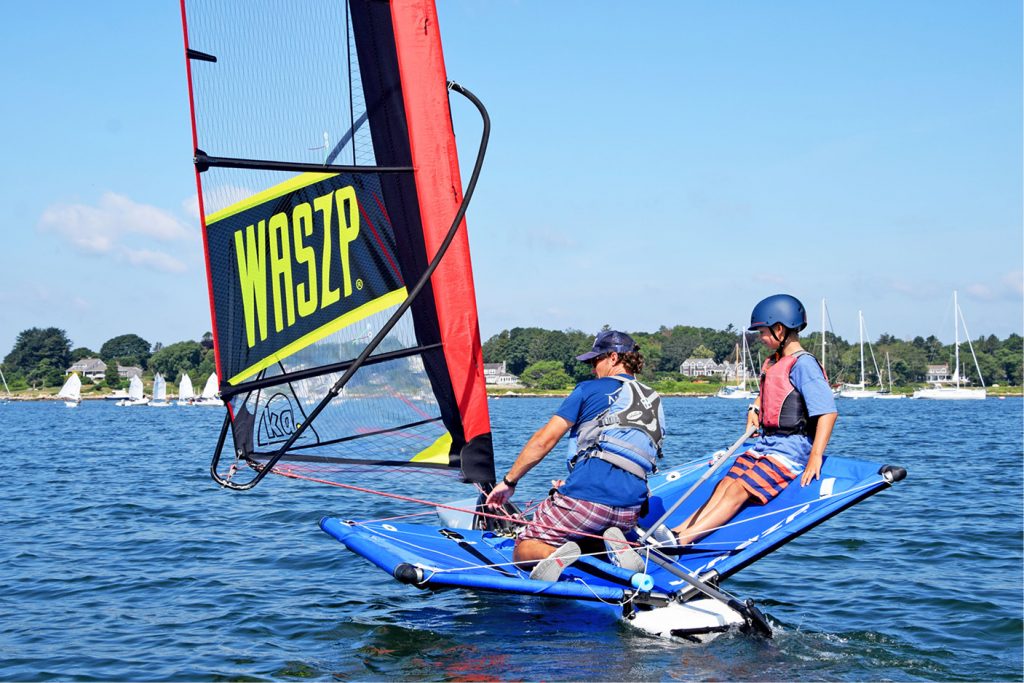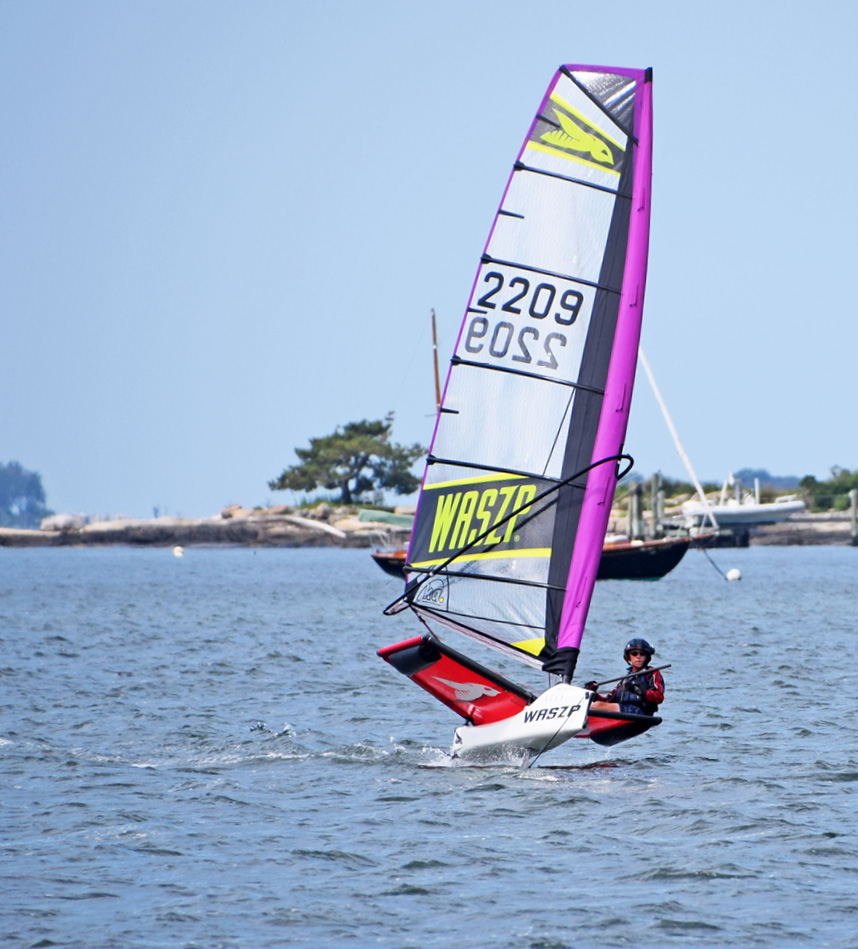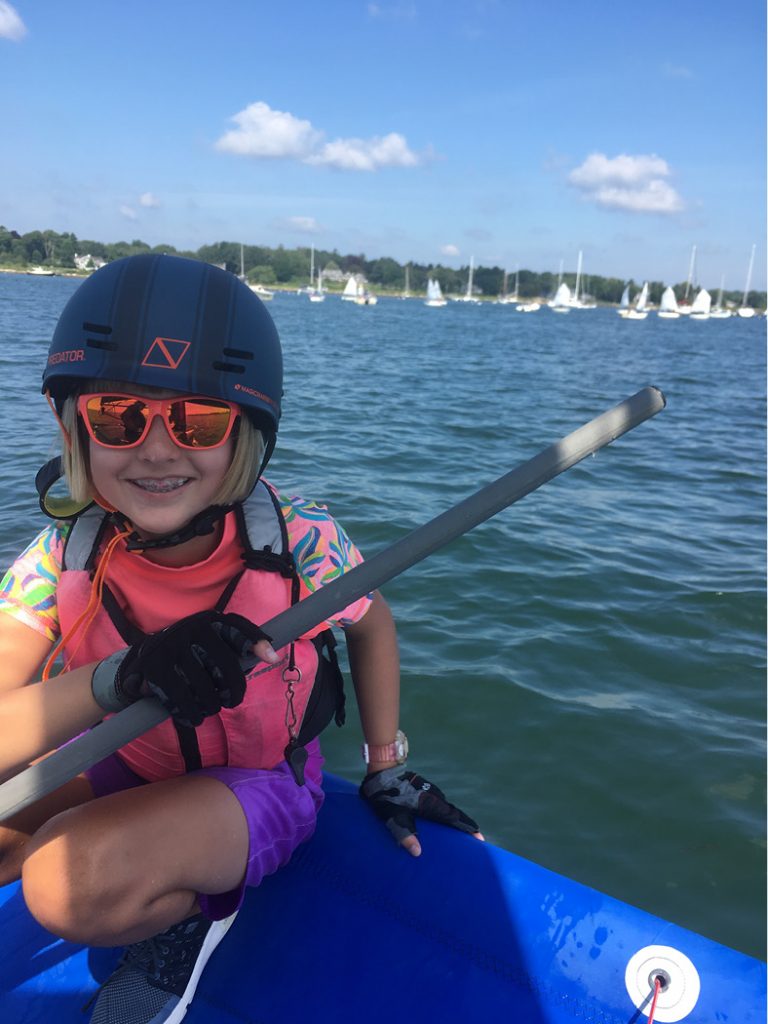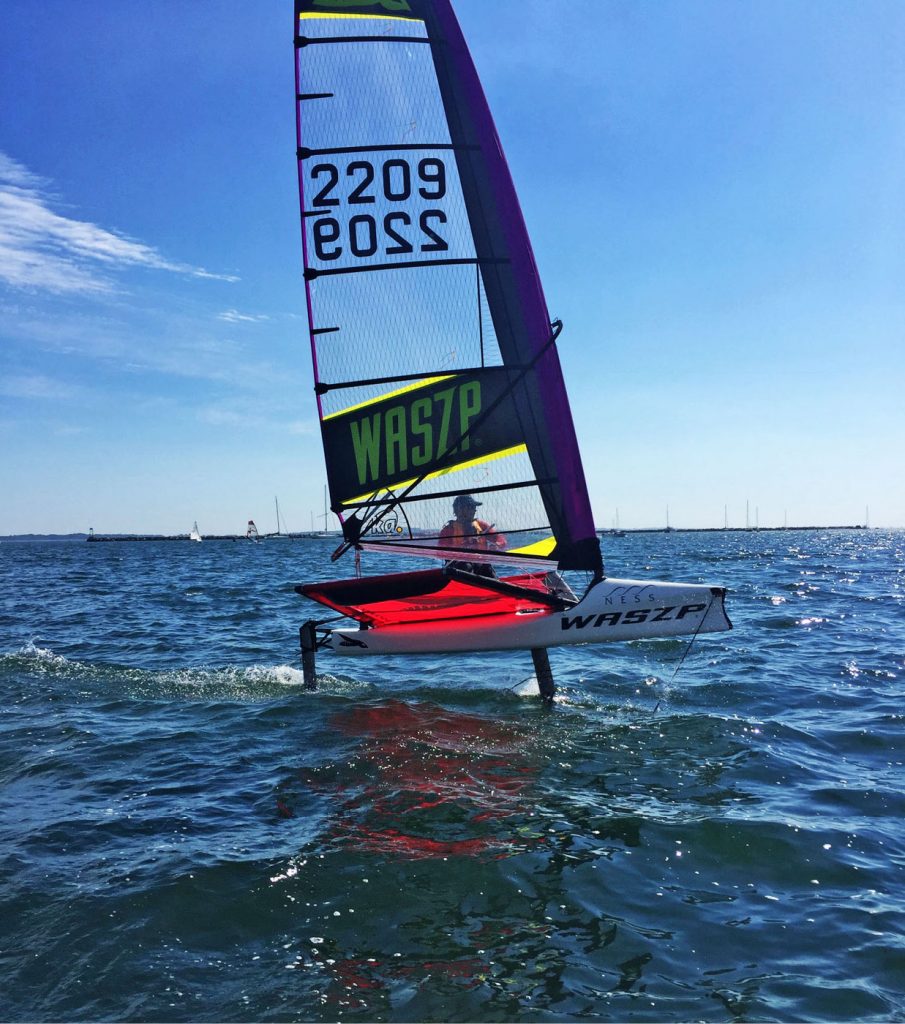New England Science & Sailing is Celebrating 20 Years of Innovative Education
If you sail into Stonington Harbor in eastern Connecticut in the summer months, you might mistake New England Science & Sailing (NESS) for a summer camp, with children sailing, wading in tidal pools with fish nets, and kayaking about. Yet, while it may resemble a camp-like experience, there is a deep educational structure behind everything that NESS does year-round. And that tenet will be nicely punctuated when you see one of the non-profit organization’s foiling watercraft zipping by.

Cleared for takeoff! Mark Zagol, NESS Managing Director Sailing & Operations, completes a Waszp pre-flight checklist with Henry Cooke. © nessf.org
Foiling at NESS goes back to 2017, when a Rhode Island philanthropist contacted the organization with an interest in donating a foiling sailboat. He had seen foilers in action and knew these high flying craft would have ignited his own passion when he was a young sailor, a fascination that also drew from his engineering background and interest in the boats’ fluid dynamics and hull efficiency. Soon after connecting with NESS Sailing Director Mark Zagol, the two began building a fleet of advanced, foil-borne watercraft.
Zagol, an All-American sailor at Old Dominion, joined NESS eleven years ago. In addition to his personal success on the water, he’s coached Olympic Gold medalist Anna Tunnicliffe Tobias and collegiate teams at the U.S. Maritime Academy and the U.S. Coast Guard Academy. He loves the sport, and sees foils as an important growth opportunity for sailing. He also sees them as a challenge. “You are coaching different hull dynamics,” he explains. “It’s a challenge to learn to foil, and an even bigger challenge to teach foiling.”
While foiling is a niche activity at NESS, it exemplifies the organization’s mission to empower students with a love of learning through ocean-based experiential programs. Founded twenty years ago by CEO Spike Lobdell following his thirty-year career in finance, NESS was built on core values of inclusiveness, experiential learning, personal growth, and stewardship. Starting in 2008, NESS began teaching marine science, which led to a focus on STEM (Science Technology, Engineering & Math), but that transformation was only the beginning. NESS now stands as the first and only program of its kind accredited by the New England Association of Schools & Colleges (NEASC).

Lucas Wiatrowski rips across Stonington Harbor. © nessf.org
Sailing, marine science, powerboating, paddling, and fishing and surfing are experiential platforms for learning at NESS. Students may spend the morning enjoying an activity on the water, but from an educational aspect, they have been introduced to a curriculum-based experience that is tied directly to classroom standards. “We keep it exciting, too,” Lobdell says, “with our foils being a prime example.”
NESS differentiates itself by teaching sailing in nineteen different classes of boats. Students begin on Optis and Harley 12s and get the joy those boats provide, along with the Sonars and J/22s, but there’s a cool factor for more accomplished sailors that comes when sailing NESS’s Esse, a 29er, or a Viper 640. That’s elevated even more when students progress to single-handing the two Waszp foiling boats, the UFO foiling catamaran, or the new wing boards, which are foiling sailboards powered by an inflatable sail you hold with your hands.
This past year, foiling at NESS also went virtual. As with all institutions, the pandemic changed life at NESS and the organization’s response was impressive. Eric Isselhardt, PhD, who joined NESS as Executive Director of Education in 2019, has a long career in education leadership, including work as CEO for Calvert Education, a Baltimore-based education powerhouse. Isselhardt oversaw the creation of eighteen proprietary online courses in subjects ranging from wave science to weather to navigation.

Ellie Menezes is all smiles after a foiling session. © nessf.org
Among these offerings is a course developed in partnership with New York Yacht Club American Magic, a challenger for the 36th America’s Cup. These embedded lessons were an ideal way to engage many more students who may not sail, but now want to become engineers. As reported here back in February, Lobdell presented the concept to Doug DeVos (one of three American Magic team principals) who immediately recognized the opportunity. “Our experience with American Magic was fantastic,” Lobdell enthuses, “from the very first conversation with Doug to every interaction with the entire team.”
The online American Magic course has been exceptionally well received by students and teachers alike. Sarah Warren, NESS’s Assistant Sailing Director, used her on-the-water experience to inform her online American Magic instruction, which reaches students and classrooms all over the world. According to Warren, “We start with an amazing video of the AC75 Patriot underway, accompanied by fun music. The kids dance around, completely entranced with the engineering marvel they see before them.”
Again, it’s about embedded lessons. The American Magic course gets into forces, wind and ballast, and it’s not about sitting back and watching a video. Using a sheet of paper, students fold out a hull and a sail and use their breath to realize the impact that sail area and hull size have on a boat. Later, students place pennies on the paper and they experience the effects of ballast. Given the interactive nature of the learning, students have a host of questions for the NESS educators. “Soon after we started,” Warren adds, “we saw the opportunity to gather common questions, and we went back to the American Magic team and taped video responses, so when a student asks a question, we can pose that to design team member Robyn Lesh, an MIT-educated engineer. The student gets to connect with American Magic, and it’s especially awesome for our students to see a young woman as an integral part of their engineering team!”

“It’s a challenge to learn to foil, and an even bigger challenge to teach foiling,” says Mark Zagol. © nessf.org
Although American Magic’s pursuit of the America’s Cup was unsuccessful, the team’s impact at NESS continues. The outcome in New Zealand advances important classroom lessons in terms of resilience and innovation. Students also experience equally compelling lessons upon learning that after Patriot capsized, every other team immediately went into rescue mode to assist the sailors and save the vessel. Teamwork is integral to all of NESS’s learning methods, especially sailing and engineering,
Like foiling, NESS stays on the leading edge of innovative education by developing additional modules for teacher training and distance learning. “Teachers are hungry for ways to excite and engage curriculum-based student learning,” says Lobdell. “Our board, funders, and certainly administrators and teachers, see this as a powerful vehicle for advancing classroom performance, especially after the challenges of the past year. It is a very exciting time for NESS.” To learn more, visit nessf.org. ■
